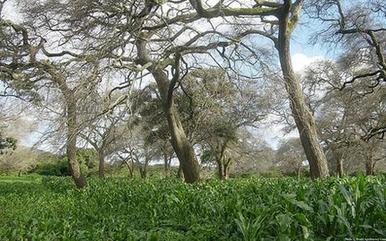
This is the VOA Special English Agriculture Report.
The United Nations estimates that world food production will have to increase by 70 percent by 2050. A world population growing in number and wealth will require one billion tons more grain each year, and 200 million tons more meat.
The Food and Agriculture Organization says those gains will have to happen largely on existing land through "sustainable intensification."
Officials say the new report provides the first "global assessment of the state of the planet's land resources." It says large parts of all continents are experiencing damage. One-fourth of all land is described as "highly degraded." The greatest threats are losses of soil quality, biodiversity and water resources.
New agricultural methods and technology increased food production in many countries during the Green Revolution. Cropland increased by twelve percent from 1961 to 2009-- yet production grew by 150 percent.
But the new report warns that production rates have been slowing in many areas. In too many places, it says, practices that have increased production have also harmed the land and water. It calls for greater use of ways that can expand production while limiting damage to ecosystems.
One such practice might be the use of "fertilizer trees." These are fast-growing trees and shrubs whose leaves and roots help improve soil. A recent study found that about 400,000 farmers in southern Africa are using them.
The study appeared in the International Journal of Agricultural Sustainability. Lead author Oluyede Ajayi is senior scientist at the World Agroforestry Center in Nairobi, Kenya.
OLUYEDE AJAYI: "Basically these are trees that can fix nitrogen from the atmosphere and convert them into nitrates for fertilizer, for organic fertilizer, for the soil."
Farmers who planted fertilizer trees reported double the maize production of other farmers. In Zambia, the fertilized fields provided up to 114 additional days of food.
Farmers say they need less rainwater if they use fertilizer trees. The trees reduce water runoff and soil erosion.
Mr Ajayi says the project began when scientists were trying to identify the main threats to food security.
OLUYEDE AJAYI: "We actually got started by about 20 years ago trying to diagnose, to look at, the chief problems within the country, within the region."
The farmers themselves designed and managed part of the testing in the field, and spread the word of their successes.
And that's the VOA Special English Agriculture Report, written by Jerilyn Watson. I'm Bob Doughty.
UN World Food Security Committee meets in Rome
Poor suffer as food prices likely to stay high
G20 experts to meet on food security solutions
Climate change threatens world food production
(来源:VOA 编辑:Rosy)
